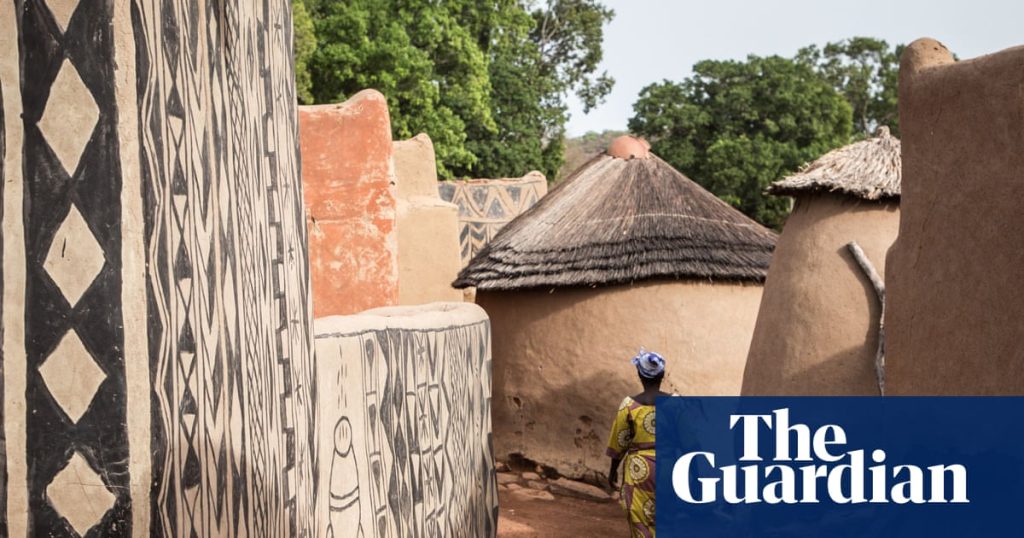A world heritage site that was once a famous tourist destination is suffering from signs of disintegration, as climate change affects weather patterns.
The wavy-walled houses covered with singular geometric lines of the Royal Court of Tiébélé in Burkina Faso, established in the 16th century, are recognisable all over the world. The paintings represent the thoughts, culture, and religion of the Kassena people, literally written on the walls.
Tiébélé in southern Burkina Faso is one of only four Burkinabé sites on the Unesco world heritage list. But it is now on the brink of extinction. “Nowadays, it’s easier to build with metal roofs and cement,” says Abdou Anè, a young resident in Tiébélé.
For many years, Tiébélé was an unmissable tourist destination in Burkina Faso. But the jihadist violence that has been rumbling through the country and its neighbours, Mali and Niger, since 2015 is deterring visitors. To reach Tiébélé, for example, a visitor has to cross a bridge known as Nazinon, which was attacked some time ago. Drivers have to keep to 30km/h and it is under heavy military control.
The failed coup d’état of 2015 and subsequent unrest has dampened the tourism industry, with numbers declining every year.
Meanwhile, the threat to the delicate structures from climate change is growing. “To paint the walls, they must be completely dry, but now the rain is unpredictable, and it has already happened that it starts raining while we’re working on restoration,” says Anè. Plastic sheets are not enough to protect the paintings. “Even though we are very proud to be recognised as a world heritage site, we also need help to keep preserving it.”
“Sometimes we get rain during periods when we didn’t before. Before, in March or April, we would get one rain known as the ‘mango rain’, but today we can get three to four rains”, says Anè. “There are trees that no longer produce, and it’s with those that we used to build our houses. This worries the population, especially the elderly who remember what the climate used to be like, because it’s a new kind of change. The rain comes abundantly – more than what people expected. It’s a phenomenon people don’t understand. For example, now we are in August and there is no rain. People are really worried. Those who have seen the seasons of the past and compare them to today are worried. Those who were born into this situation don’t understand the change.”
In Kassena culture, found only in this region of the world, the women are responsible for painting the houses. For the unique painted lines, they use pigments extracted from laterite stone, clay, basalt, and even cow dung – materials native to the region. To fix the markings to the walls, they boil the fruit of the néré tree, also known as the “flour tree”, to make a varnish that seals the paint. All this knowledge and skill resides in the head of octogenarian Kaye Tintama, recognised as a “living human treasure” by Unesco, a living library responsible for passing on the decoration techniques and the meanings behind the walls and shapes of Tiébélé’s houses to new generations.
The award-winning architect Francis Kéré has been inspired by the way the Kassena have used natural materials to protect themselves from intense heat and heavy rain for hundreds of years. “[The] Kassena passed his architecture to the present, to the future generations, and this method is inspiring for me,” Kéré told the Guardian.
The shape of the houses is significant. Round houses such as Ané’s are for unmarried men, but those shaped like a figure of eight are for older women and unmarried daughters, and rectangular houses are for young couples. “They inspired me to use locally available materials to create the habitat, but also the way they create, they involve all the community, which is highly important for me,” says Kéré.
Many of the houses feature a small entrance door to prevent animals from coming in, but also to force visitors to kneel, a position of vulnerability that allows inhabitants to neutralise a possible intruder.
The rooftops are designed to dry cereals after the harvest. On the walls, reliefs of snakes symbolise the spirits of grandmothers or the cultural guardian spirit of the Kassena people, who appears once a year during which the population must remain silent and avoid music as it passes. It’s a monument under open skies that now coexists with concrete, sheet metal, and iron windows. “It’s very hard to find straw to make the roofs,” explains Ané as he points to the paillote of his house, destroyed by the wind.
The men are in charge of building the houses. It takes a month and a mix of earth, straw, and logs to build the structure. “Chemical products have weakened the soil,” explains Ané, lamenting that the houses no longer last like they used to.
In this part of the world, the climate crisis is felt in an accelerated way and without the resources to face it. Even though Sahel countries contribute only 1% of global greenhouse gas emissions, they are among those suffering the most from its consequences: temperatures have risen 1.5 times faster than the global average. Additionally, 80% of Burkina Faso’s population lives from agriculture and land-based work.

